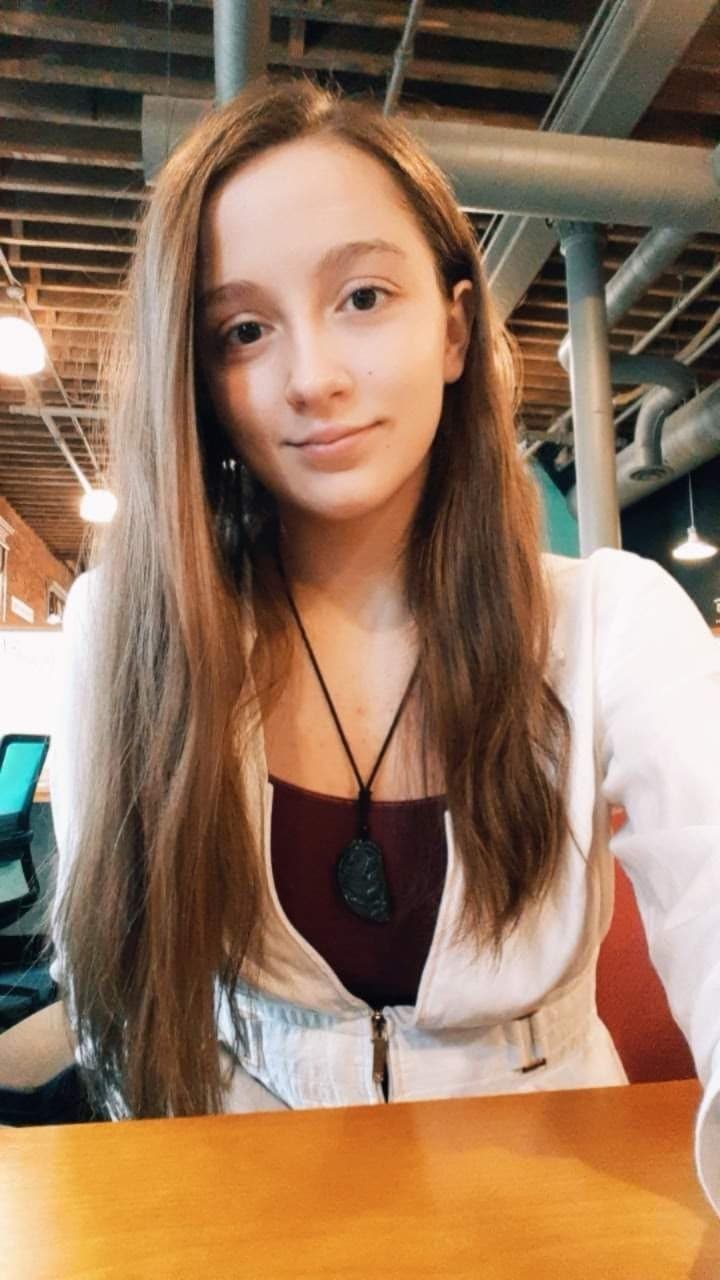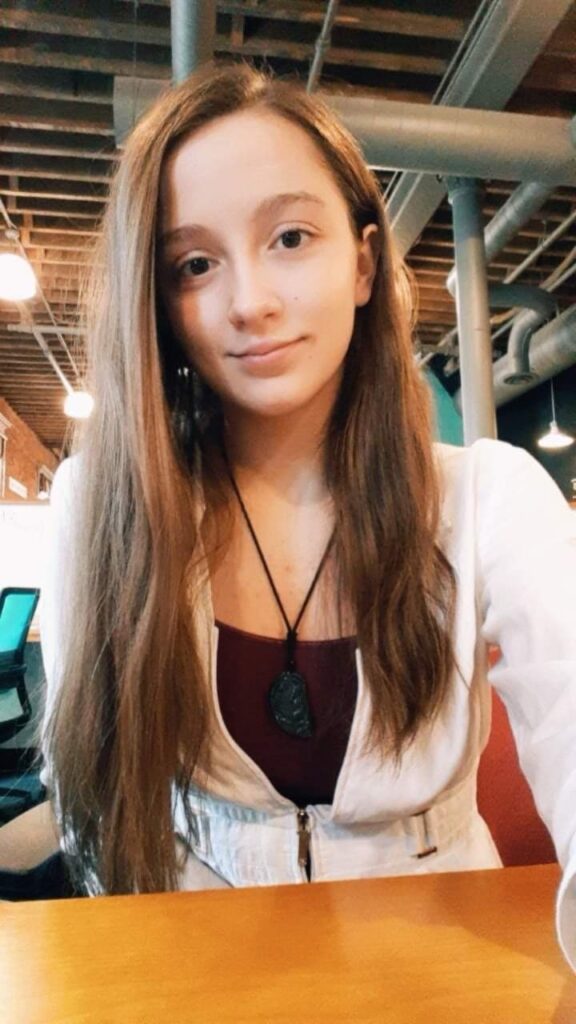Impact Stories: Summer
Student Says Better Marketing, Higher-Level Instruction Would Draw More Girls to CS

“If the design side of computer science was marketed better, more girls would get interested.”
Summer Sexton, an alum of the immersive Nextech Catapult program, knows what she’s talking about. Almost as soon as she learned about computer science, her career plans took a definitive turn away from nursing and toward the still-male-dominated field of computer science.
She’s now a college freshman at IUPUI majoring in web design and informatics.
What steered her toward a field that so many young women shy away from? A math-turned-computer science teacher and the immersive Nextech Catapult program.
A ‘Nerd’ of a Different Kind
This articulate young woman describes herself as “a big nerd who talks too much” – but not because she likes computers.
“I was a major performing-arts kid. I was a theater kid, an orchestra kid. You could always find me around the performing arts center.”
She’d been interested in computers since she was a little girl, though, doing a little coding through Forms on Windows XP (a now 15-year-old operating system). Then she made a best friend whose father was a high school CS teacher.
“Mr. Law has a massive passion for computer science. He was the typical gamer-turned-programmer. It definitely showed that he loved what he was teaching his students,” Summer said. “It was knowing Mr. Law that gave me the nudge to take CS. Then I quickly realized this is what I want to do. I got into the design side, but I enjoyed the programming, too, especially when I did Catapult.”
Summer called Nextech’s immersive Catapult program “pivotal” in solidifying her decision to pursue computer science as a career. She’d just finished her first year of high school CS and was on the fence about going into medicine or not.
“At Catapult, it was eye-opening to see all the people interested in CS, to network with so many other people and to learn about what the industry actually is. I had no idea how big the tech scene is. Catapult gave me the information I needed to decide this is where I want my future to be,” she said.
She especially loved learning about UX/UI design during tours of companies that allow Catapult students to visit – so much so, in fact, that she started teaching her little sisters about the possibilities CS offers.
“Before those company tours, I had no clue about all the fields that were in CS, even though I’ve been using CS since before kindergarten. I didn’t think about the numbers, the stats, all of it,” she said. “The field is crazy large. I think that if girls knew, a lot more would give it a chance.”
Even in college, she still doesn’t see an equal number of men and women in CS classes.
“More like 30% women,” she said.
Students need more meaningful and modern CS instruction
Schools could do a much better job not only marketing computer science to girls but in creating meaningful CS classes for all students.
“It’s baffling from my perspective. I graduated in the class of 2021. I had zero required computer knowledge classes even though I had a Chromebook in my hand every day,” she said. “We were all just floundering together. I was pretty much tech support for my teachers.”
She believes students today are much more capable with technology than adults realize, and they need higher-level information than the kind of common-sense, digital responsibility class one of her younger sisters must take.
“Almost every single student in the classroom owns a computer or a cell phone or a gaming console. This generation lives, eats, breathes tech, and schools could take advantage of that with classes like, how do you know you’re going to safe websites? How do you know that what you’re buying isn’t a scam? How do you protect your identity? That’s what students need,” she said.
Summer also believes schools are already in a position to provide CS instruction at this level.
“If high schools can offer things like biomedical engineering classes and dentistry assistant certifications, then they can offer data analysis and IT certifications. That’s what’s popular right now and where the necessary jobs are. As a way of addressing poverty, schools could be setting kids up for life,” she said.
Summer Sexton will be a teaching assistant during the summer 2022 Catapult session. She is also a web intern for the IUPUI Department of Undergraduate Education.

“If the design side of computer science was marketed better, more girls would get interested.”
Summer Sexton, an alum of the immersive Nextech Catapult program, knows what she’s talking about. Almost as soon as she learned about computer science, her career plans took a definitive turn away from nursing and toward the still-male-dominated field of computer science.
She’s now a college freshman at IUPUI majoring in web design and informatics.
What steered her toward a field that so many young women shy away from? A math-turned-computer science teacher and the immersive Nextech Catapult program.
A ‘Nerd’ of a Different Kind
This articulate young woman describes herself as “a big nerd who talks too much” – but not because she likes computers.
“I was a major performing-arts kid. I was a theater kid, an orchestra kid. You could always find me around the performing arts center.”
She’d been interested in computers since she was a little girl, though, doing a little coding through Forms on Windows XP (a now 15-year-old operating system). Then she made a best friend whose father was a high school CS teacher.
“Mr. Law has a massive passion for computer science. He was the typical gamer-turned-programmer. It definitely showed that he loved what he was teaching his students,” Summer said. “It was knowing Mr. Law that gave me the nudge to take CS. Then I quickly realized this is what I want to do. I got into the design side, but I enjoyed the programming, too, especially when I did Catapult.”
Summer called Nextech’s immersive Catapult program “pivotal” in solidifying her decision to pursue computer science as a career. She’d just finished her first year of high school CS and was on the fence about going into medicine or not.
“At Catapult, it was eye-opening to see all the people interested in CS, to network with so many other people and to learn about what the industry actually is. I had no idea how big the tech scene is. Catapult gave me the information I needed to decide this is where I want my future to be,” she said.
She especially loved learning about UX/UI design during tours of companies that allow Catapult students to visit – so much so, in fact, that she started teaching her little sisters about the possibilities CS offers.
“Before those company tours, I had no clue about all the fields that were in CS, even though I’ve been using CS since before kindergarten. I didn’t think about the numbers, the stats, all of it,” she said. “The field is crazy large. I think that if girls knew, a lot more would give it a chance.”
Even in college, she still doesn’t see an equal number of men and women in CS classes.
“More like 30% women,” she said.
Students need more meaningful and modern CS instruction
Schools could do a much better job not only marketing computer science to girls but in creating meaningful CS classes for all students.
“It’s baffling from my perspective. I graduated in the class of 2021. I had zero required computer knowledge classes even though I had a Chromebook in my hand every day,” she said. “We were all just floundering together. I was pretty much tech support for my teachers.”
She believes students today are much more capable with technology than adults realize, and they need higher-level information than the kind of common-sense, digital responsibility class one of her younger sisters must take.
“Almost every single student in the classroom owns a computer or a cell phone or a gaming console. This generation lives, eats, breathes tech, and schools could take advantage of that with classes like, how do you know you’re going to safe websites? How do you know that what you’re buying isn’t a scam? How do you protect your identity? That’s what students need,” she said.
Summer also believes schools are already in a position to provide CS instruction at this level.
“If high schools can offer things like biomedical engineering classes and dentistry assistant certifications, then they can offer data analysis and IT certifications. That’s what’s popular right now and where the necessary jobs are. As a way of addressing poverty, schools could be setting kids up for life,” she said.
Summer Sexton will be a teaching assistant during the summer 2022 Catapult session. She is also a web intern for the IUPUI Department of Undergraduate Education.


